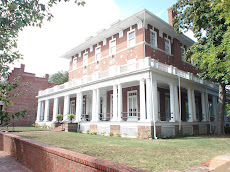By Julian Walker
Philip Walzer
The Virginian-Pilot
© January 17, 2010
The plan
Gov. Bob McDonnell focused on job creation on the campaign trail and said he will make it a priority “on Day One.” Here are some of the steps he has outlined to create new jobs in the state.
■McDonnell hopes to double the Governor’s Opportunity Fund, a source of grants to entice businesses to move here.
■Make Virginia’s $1,000-a-job business tax credit trigger at 50 new jobs created, rather than the current minimum of 100 jobs.
■Less red tape and oversight for businesses, though few specifics yet.
■A campaign promise of particular interest to our region, no specifics are outlined yet.
■McDonnell wants to create a one-stop process for businesses to get all their needed permits within 48 hours.
■Lt. Gov. Bill Bolling has been designated job creation officer, and McDonnell has said his first executive order will be a job-creation task force
His slogan touted "Bob for jobs," and he promised to be Virginia's "jobs governor."
Gov. Bob McDonnell rode into office with jobs creation as his No. 1 theme. It wasn't just a campaign gimmick, he said last week.
"I know that's what I said I'd do and that's why people hired me," he said at a pre-inaugural stop in Norfolk. "So that's the thing I better get started on on Day One."
McDonnell, who was sworn in Saturday, proposed a melange of specific tools and broad themes to expand the state's job base.
Notwithstanding the state's $4.2 billion shortfall, he vowed to double the Governor's Opportunity Fund - a source of grants to entice businesses to move to the state - to $20 million a year. As of 2005, a similar fund in North Carolina was three times as large, McDonnell said. "No wonder we're getting beat," he said last week.
McDonnell, a Republican, also promised to expand Virginia's $1,000-a-job business tax credit. Now it kicks in when a company creates 100 jobs. He wants the trigger to be 50 new jobs.
Other pledges include reduced regulation for businesses, increased grants for tourism, and a one-stop process for businesses to get all needed permits within 48 hours.
He also spread the responsibility for building jobs. McDonnell designated Lt. Gov. Bill Bolling the state's job creation officer and said his first executive order would be to appoint a job-creation task force.
Virginia already is seen as a business-friendly state, partly because of strong right-to-work laws and relatively light regulation. Last year it was ranked the best state for business by Forbes.com and CNBC. That's why McDonnell needs to keep pushing for jobs, says Thomas Farrell II, chairman and CEO of Dominion Resources Inc.
"We have a very well-regarded state in the business community," Farrell said. "But you can't stand still on that, because other states are after that."
Many business advocates are encouraged by McDonnell's thrust. "I'm very pleased to see this emphasis on job creation and economic development," said Clayton Roberts, president of Virginia Free, a nonpartisan business coalition based in Richmond. "I think that, given the budget constraints, this may be one area where he can really seek to accomplish meaningful results."
Some academics and economists, though, question whether pumping up the Opportunity Fund - or anything a governor does - will make much difference.
"A lot of companies that you offer this to and take it will relocate to your state anyway," said Tim Bartik, senior economist for the W.E. Upjohn Institute for Employment Research in Kalamazoo, Mich. "People are making decisions that don't have much to do with state policy."
Others say providing strong transportation and education systems - Virginia has won plaudits for the latter, barbs for the former - is equally important in influencing companies.
McDonnell hasn't specified a target for new jobs. Bolling said success would be reflected, in part, by the state's employment rate in four years. Virginia's jobless rate is 6.4 percent, compared with 10 percent nationally.
"We understand that the economic recovery is going to be driven primarily at the national level," Bolling said. "There's not a lot we can do in Virginia to drive that. What we can do is position Virginia now to take advantage of that future economic recovery once it starts to happen."
Development officials and economists tend to take opposite sides on the value of incentive grants.
"In these economic times, incentives are very, very important for businesses," said Steven Wright, Chesapeake's economic development director. "They're always looking to reduce their bottom line."
Darryl Gosnell, president and CEO of the Hampton Roads Economic Development Alliance, which works with local governments to attract businesses, pointed to a case last year when Hampton Roads lost a potential employer because the state couldn't provide enough money.
The firm - which Gosnell would not name, but said was in the distribution business - chose South Carolina because it offered at least $20 million more, he said. "Our competitors have much better-funded incentive packages. They're absolutely critical. Like them or hate them, they're a fact of life."
Yet Bartik isn't the only skeptical economist. Terry Rephann at the University of Virginia called the grants "largely wasteful expenditures." Peter McHenry of the College of William and Mary said, "They tend to be expensive for the effects they have."
Michael Cassidy, executive director of the Commonwealth Institute for Fiscal Analysis, a nonprofit think tank in Richmond, also questioned the impact of the tax-credit proposal. "Fifty jobs is still a very high threshold," he said. "Small businesses are not likely to see a lot of benefit from that."
What else can McDonnell do to generate jobs?
For starters, don't cut funding for the state's economic-development arm, the Virginia Economic Development Partnership, said Dorcas Helfant-Browning, a local real estate executive who is chairwoman of the Virginia Chamber of Commerce. The state agency is "sorely underfunded and largely unable to tout our superior position," wrote chamber leaders, including Helfant-Browning and Farrell, in a letter to McDonnell last month.
The chamber's No. 1 suggestion: Fix the state's transportation logjams. "The ability to move goods and people is integral to Virginia's continued economic competitiveness," the letter said.
McDonnell has vowed to push through a transportation plan, relying on the sale of state liquor stores, public-private partnerships and revenue from offshore oil drilling.
Maintaining strong work force training programs, primarily through two- and four-year colleges, also is crucial, observers said. When he was governor, Democratic U.S. Sen. Mark Warner said, the proximity to community colleges and university research programs helped clinch deals with some companies.
Canon Virginia Inc. in 2008 announced a $640 million expansion of its Newport News plant. It already has added 520 of a promised 1,000 extra jobs, spokeswoman Rhonda Bunn said. Under Democratic Gov. Timothy M. Kaine, Virginia provided Canon more than $21 million in grants.
The money, Bunn said in an e-mail, was "one of the considerations," but "not the key factor," in Canon's decision to expand locally. In a statement, Canon Virginia's chairman, Takayoshi Hanagata, cited Virginia's "favorable business climate, available and skilled talent and the resources to continue developing our workforce."
Subscribe to:
Post Comments (Atom)














































No comments:
Post a Comment